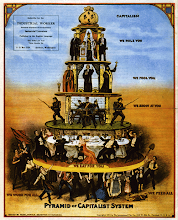skip to main |
skip to sidebar
Recommended Web Reads This Week May 1-7
Article on the relevancy of Rosa Luxemburg:
The spontaneous mass revolts in north Africa and the Middle East, especially in Tunisia, Egypt and Libya, underline the importance of Luxemburg’s contribution. She understood better than any Marxist of her time (and better than most after it) that revolution is never ‘made’ by some enlightened party or individuals, but rather emerges spontaneously from the response of masses of people to social conditions. She was always looking for the unexpected to come from the masses, and her work helps train our eyes in precisely that direction.
Equally important is her understanding of what happens after the revolution. She held that there is no socialism without democracy, just as there is no democracy without socialism. She gave grief to anyone, whether friend or foe, who fell short of envisioning social change as a liberation and freeing of humanity’s innate and acquired talents and abilities. In this sense she was part of an idealist strain within Marxism that has been neglected for far too long. Let’s not forget that in 1844 Marx defined his philosophy as humanism that consists of the unity of idealism and materialism. We need that unity now more than ever.
I moved to the US a year before 9/11. The day after the attack, a drunk tried to set the local mosque on fire. I first visited Ground Zero in July 2002 and could only cry and pray. "Good riddance, Bin Laden," I wanted to shout on Monday; but this new American instead quietly recited Al Fatiha, the opening chapter of the Qur'an, with "USA, USA USA" as my backdrop. I recited it for the innocent lives taken in NYC, Washington DC, Shanksville in Pennsylvania, Afghanistan, Iraq and Pakistan – wherever the war on terror left its stains.
This name-calling is a form of misdirection, an attempt to evade a serious debate about U.S. agricultural policies. And it gets the elitism charge precisely backward. America’s current system of food production — overly centralized and industrialized, overly controlled by a handful of companies, overly reliant on monocultures, pesticides, chemical fertilizers, chemical additives, genetically modified organisms, factory farms, government subsidies and fossil fuels — is profoundly undemocratic. It is one more sign of how the few now rule the many. And it’s inflicting tremendous harm on American farmers, workers and consumers.




No comments:
Post a Comment